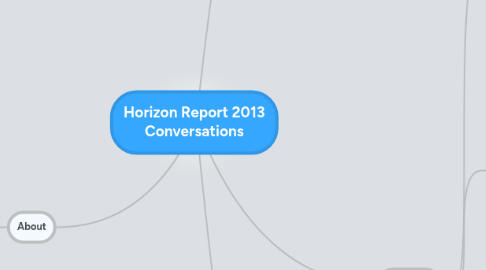
1. About
1.1. 2013 Higher Education Edition
1.1.1. Announcement
1.1.2. Video
1.1.3. PDF
1.1.4. Infographic (beta)
1.2. Wiki
1.3. Project Navigator
1.4. Facebook
1.5. Twitter #NMChz
2. 1-2 years
2.1. MOOCs
2.1.1. UMich
2.1.1.1. official
2.1.1.1.1. Coursera
2.1.1.1.2. Open Michigan
2.1.1.2. other
2.1.1.2.1. P2PU
2.1.1.2.2. Udacity
2.1.1.2.3. etc
2.1.2. Other
2.1.2.1. Learning from Data
2.1.2.2. Games MOOC
2.2. Tablet computing
2.2.1. UMich
2.2.1.1. iPads Med School
2.2.1.1.1. in discussion
2.2.1.2. Housing Information Technology Office
2.2.1.3. Human Resources
2.2.1.3.1. staff use
2.2.1.4. Papyrus 46 (library)
2.2.1.5. Engineering
2.2.1.5.1. Apps
2.2.1.6. Mobile Users Group
2.2.1.7. Mobile Developers Groups
2.2.1.8. LSA Advising Center
2.2.1.8.1. MyTime
2.2.1.8.2. MyGuide
2.2.1.9. Mobile App Challenge
2.2.1.10. UMMS Mobile Development Team (Laurie Kirchmeier)
2.2.1.11. Kinect SDK Kit
2.2.2. Other
2.2.2.1. Yale: Shared Visions – Yale Students Use iPads to View Live Microscope Images
2.2.2.2. Vanderbilt: App turns tablet into math aid for visually impaired students
2.2.2.2.1. Haptic
2.2.2.3. Northwestern: Chinese language class experiments with iPad
3. 3-4 years
3.1. Big Data
3.1.1. UMich
3.1.1.1. Eating and Attitudes
3.1.1.2. ORCI
3.1.1.3. Infrastructure
3.1.1.3.1. workshops
3.1.1.3.2. accounts
3.1.1.3.3. tutorials
3.1.1.3.4. options for skills building
3.2. Learning Analytics
3.2.1. UMich
3.2.1.1. Tim McKay, Physics
3.2.1.2. Steve Lonn, Library
3.2.1.3. Anne Gere, Sweetland
3.2.1.4. LATF
3.2.2. Other
3.2.2.1. Stanford: Multimodal Learning Analytics
3.2.2.2. Glass Classroom
3.3. Game-Based Learning
3.3.1. Umich
3.3.1.1. UMD
3.3.1.1.1. Bruce Maxim
3.3.1.1.2. Game design
3.3.1.1.3. Game day
3.3.1.1.4. Bibliobouts
3.3.1.2. UMAA
3.3.1.2.1. SoE
3.3.1.2.2. Engin? UMSI?
3.3.1.2.3. Gamification engine for instruction
3.3.2. Other
3.3.2.1. McGill: Open Orchestra
3.3.2.1.1. Requires complicated equipment set up
3.3.2.2. Fresno State: Library Orientation Game
3.3.2.3. Fresno example inspired other thoughts
3.3.2.3.1. Comics: Library of the Living Dead (pdf)
3.3.2.3.2. Augmented Reality interactive tours
4. 5-6 years
4.1. 3D Printing
4.1.1. UMich
4.1.1.1. FabLab
4.1.1.2. Duderstadt
4.1.1.2.1. 3D lab
4.1.1.2.2. CAVE
4.1.1.3. Electronic Lunch
4.1.1.3.1. Festifools
4.1.1.3.2. Lumenotbots
4.1.2. Other
4.1.2.1. Case U: ThinkBox
4.1.2.2. U. Mary Washington: ThinkLab
4.1.2.3. Desktop Drugstores
4.1.2.4. Stanford FabLearn
4.1.2.5. Discussion
4.1.2.5.1. Green Chem / Green Medicine
4.1.2.5.2. "FabLabs" & Makerspaces in Libraries
4.1.2.5.3. Copyright & intellectual property
4.1.2.5.4. Liability & legal issues
4.1.2.5.5. Process design for learning
4.2. Wearable Technology
4.2.1. UMich
4.2.1.1. Pebble Watch
4.2.1.1.1. Pebblizer
4.2.1.1.2. Kickstarter
4.2.1.1.3. Facebook
4.2.1.1.4. Twitter
4.2.1.1.5. Pinterest
4.2.1.2. Will an Apple Watch Replace the iPhone?
4.2.1.3. PF Anderson's Wearable Tech Pinterest Board
4.2.2. Other
4.2.2.1. Educational examples?
4.2.2.1.1. Georgia Tech
4.2.2.2. Wearable tech that charges devices may make it possible to bring education, research, science, tech into spaces where lack of infrastructure has previously made that challenging.
